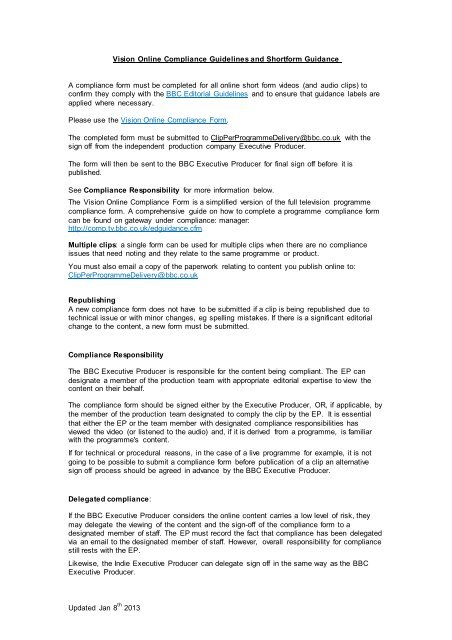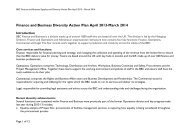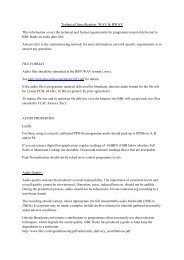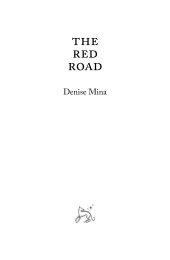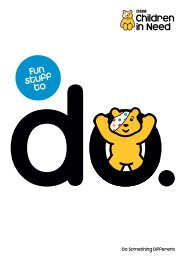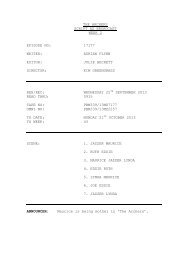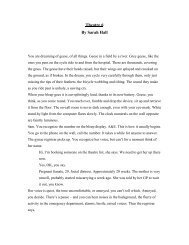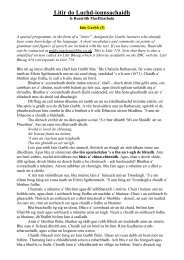Online Compliance Guidelines - BBC
Online Compliance Guidelines - BBC
Online Compliance Guidelines - BBC
You also want an ePaper? Increase the reach of your titles
YUMPU automatically turns print PDFs into web optimized ePapers that Google loves.
Vision <strong>Online</strong> <strong>Compliance</strong> <strong>Guidelines</strong> and Shortform Guidance<br />
A compliance form must be completed for all online short form videos (and audio clips) to<br />
confirm they comply with the <strong>BBC</strong> Editorial <strong>Guidelines</strong> and to ensure that guidance labels are<br />
applied where necessary.<br />
Please use the Vision <strong>Online</strong> <strong>Compliance</strong> Form.<br />
The completed form must be submitted to ClipPerProgrammeDelivery@bbc.co.uk with the<br />
sign off from the independent production company Executive Producer.<br />
The form will then be sent to the <strong>BBC</strong> Executive Producer for final sign off before it is<br />
published.<br />
See <strong>Compliance</strong> Responsibility for more information below.<br />
The Vision <strong>Online</strong> <strong>Compliance</strong> Form is a simplified version of the full television programme<br />
compliance form. A comprehensive guide on how to complete a programme compliance form<br />
can be found on gateway under compliance: manager:<br />
http://comp.tv.bbc.co.uk/edguidance.cfm<br />
Multiple clips: a single form can be used for multiple clips when there are no compliance<br />
issues that need noting and they relate to the same programme or product.<br />
You must also email a copy of the paperwork relating to content you publish online to:<br />
ClipPerProgrammeDelivery@bbc.co.uk<br />
Republishing<br />
A new compliance form does not have to be submitted if a clip is being republished due to<br />
technical issue or with minor changes, eg spelling mistakes. If there is a significant editorial<br />
change to the content, a new form must be submitted.<br />
<strong>Compliance</strong> Responsibility<br />
The <strong>BBC</strong> Executive Producer is responsible for the content being compliant. The EP can<br />
designate a member of the production team with appropriate editorial expertise to view the<br />
content on their behalf.<br />
The compliance form should be signed either by the Executive Producer, OR, if applicable, by<br />
the member of the production team designated to comply the clip by the EP. It is essential<br />
that either the EP or the team member with designated compliance responsibilities has<br />
viewed the video (or listened to the audio) and, if it is derived from a programme, is familiar<br />
with the programme's content.<br />
If for technical or procedural reasons, in the case of a live programme for example, it is not<br />
going to be possible to submit a compliance form before publication of a clip an alternative<br />
sign off process should be agreed in advance by the <strong>BBC</strong> Executive Producer.<br />
Delegated compliance:<br />
If the <strong>BBC</strong> Executive Producer considers the online content carries a low level of risk, they<br />
may delegate the viewing of the content and the sign-off of the compliance form to a<br />
designated member of staff. The EP must record the fact that compliance has been delegated<br />
via an email to the designated member of staff. However, overall responsibility for compliance<br />
still rests with the EP.<br />
Likewise, the Indie Executive Producer can delegate sign off in the same way as the <strong>BBC</strong><br />
Executive Producer.<br />
Updated Jan 8 th 2013
Delegated compliance is NOT always advisable. Exec Producers should assess the level of<br />
risk involved in online content which may include issues such as but not restricted to the<br />
following:<br />
is the programme on the managed risk list; does it contain controversial or extremely sensitive<br />
material; is there a risk that material taken out of context could lead to legal or Editorial Policy<br />
issues; does a careful assessment need to be made regarding young or vulnerable<br />
contributors; will the embedding of the clip cause problems for the programme or for<br />
contributors; does the clip meet user expectations; is the clip representative of the tv<br />
programme.<br />
The <strong>BBC</strong> requires consistency in compliance across all <strong>BBC</strong> platforms. Channel <strong>Compliance</strong><br />
Managers can provide guidance on short form content. If the video carries content that<br />
requires a mandatory referral, the Executive Producer or designated individual must contact<br />
the relevant Controller and obtain authorisation.<br />
Some clips may require a Guidance label. These can be accessed in the Guidance Labels.<br />
Guidance covering the use of labels is featured below.<br />
---------------------------------------------------------------------------------------------------------------------------<br />
Other Content<br />
Other content, such as text and images, does not have be individually complied, but<br />
the Exec must ensure that they have put in place satisfactory procedures to ensure<br />
that content is compliant with <strong>BBC</strong> editorial guidelines.<br />
This includes a process for escalation of issues or queries. They should also decide,<br />
based on what content is planned, whether it is necessary to re-check ongoing<br />
updates.<br />
Sign off of this content can be done via email confirmation.<br />
Save a copy of the paperwork.<br />
The clip will be a permanent record of your programme. It should be representative of the<br />
programme, and the content should meet the audience expectation of the show.<br />
Clip Guidance<br />
Context is key to the acceptability of shortform content. A short clip, taken out of context may<br />
produce an impact or generate consequences that would not arise within a full-length<br />
programme.<br />
All programmes and especially Factual programmes have to take care that clips accurately<br />
reflect their editorial content and are fair to contributors. If a <strong>BBC</strong> lawyer has been consulted<br />
concerning the programme this should be noted on the compliance form.<br />
Young and vulnerable contributors should be treated with special care when selecting clips.<br />
Remember that clips are now embedded online and can attract negative comments from<br />
online users which can be harmful and distressing for some contributors. It can be difficult for<br />
young and vulnerable contributors to make an assessment of the possible long-term impact of<br />
their contribution. For example, some contributors may object to a clip which refers back to a<br />
difficult time in their lives which they subsequently feel they have outgrown. A short clip is a<br />
more accessible reminder than a television programme which may only be repeated within a<br />
specific time frame.<br />
Updated Jan 8 th 2013
<strong>Online</strong> content is available worldwide therefore care should be taken when using clips from<br />
contributors who may require anonymity for themselves of their families outside the UK<br />
Guidance for the <strong>Online</strong> <strong>Compliance</strong> Form<br />
Offensive Language<br />
Care should be taken with musical lyrics used in soundtrack or performance, as well as<br />
spoken language and gestures.<br />
Strong language means “motherfucker”, “cunt”, “fuck” and its derivatives. Any proposal to use<br />
strong language is a mandatory referral to the relevant channel controller, Care should also<br />
be exercised over any offensive language, especially terms relating to ethnicity, faith or<br />
sexually pejorative terms. The Channel <strong>Compliance</strong> Manager can advise on labelling of<br />
content. Read more about Guidance Labels.<br />
Sex/Nudity<br />
Please record on the compliance form any kind of sexual activity within a clip or any nudity,<br />
whether in a sexual or non-sexual context.<br />
Imitative Behaviour<br />
This section deals with the possibility of audiences, especially children, imitating anti-social,<br />
life-threatening or criminal behaviour.<br />
Short form content can be distributed across a wide variety of sites over a long period, so<br />
consider carefully whether a clip which features this type of behaviour is suitable for use.<br />
Disturbing/Violent Content<br />
Any scene containing violence must be noted. This is relevant to all programmes genres.<br />
Spoof violence may be offensive or disturbing.<br />
Violence involving animals as well as people needs to be noted.<br />
Disturbing scenes which may be upsetting for an audience, or which have the potential to<br />
cause a significant impact at a particular time or in a different context (eg after a train crash or<br />
natural disaster) need to be considered carefully and noted.<br />
Updated Jan 8 th 2013


